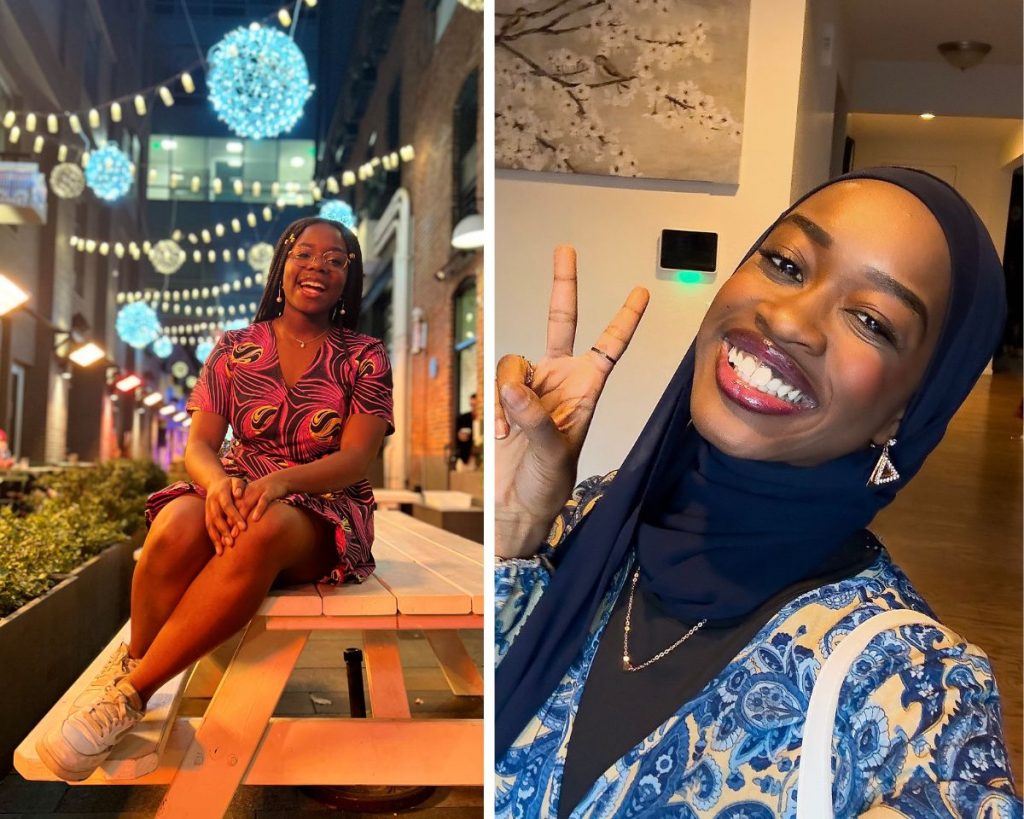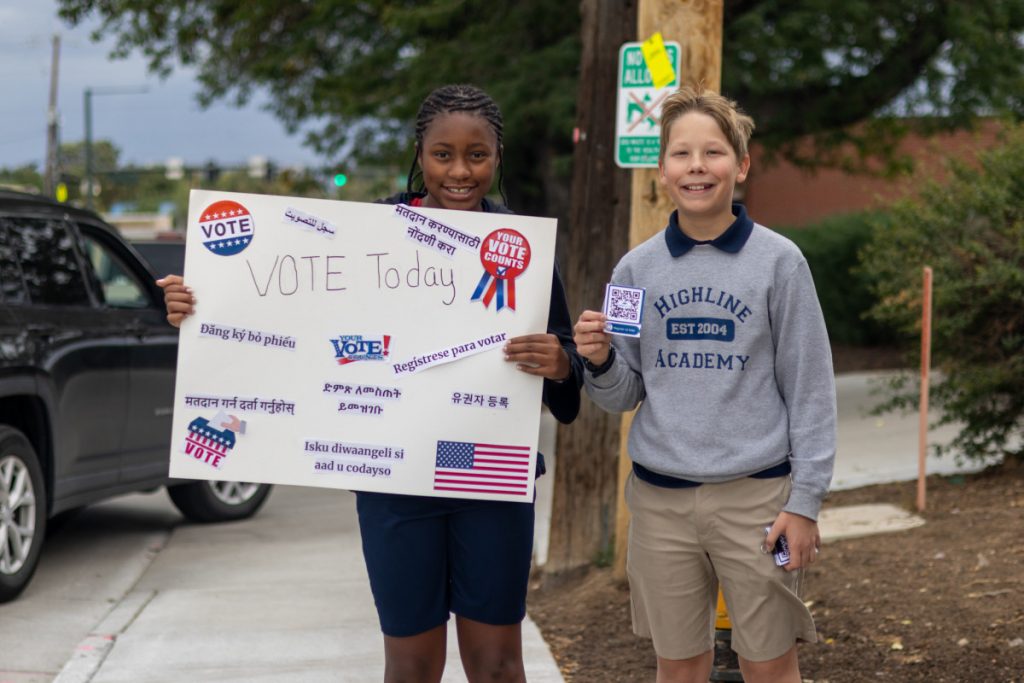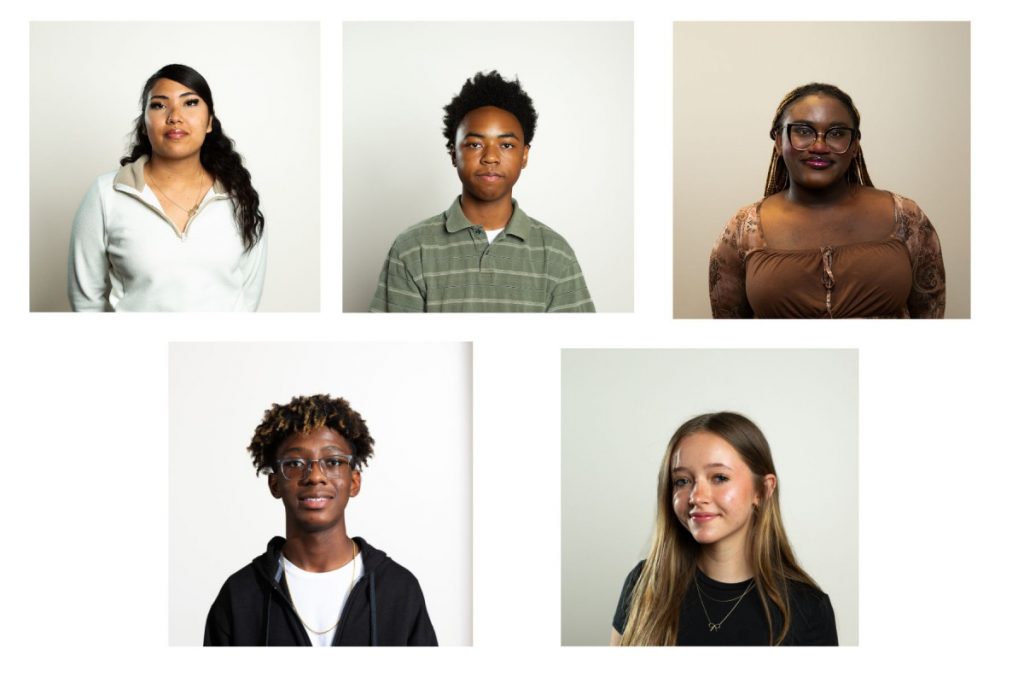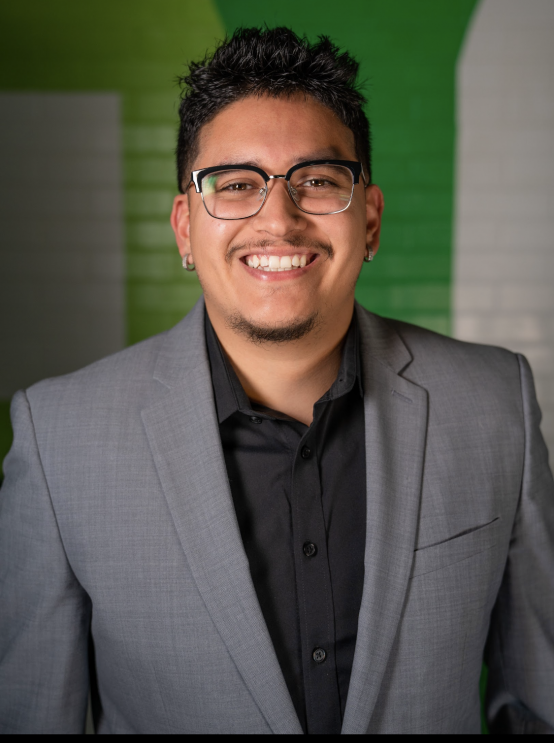Editor’s note: This commentary is written by two DPS students, Sydelle Buyungo and Houlaye Sy, who were part of the vision team in the Denver Education Vision Project. The Denver Education Vision Project was created based on the belief that there is work to be done to provide an equitable education for every young person in Denver.
RootED Denver (a Boardhawk funder) and the Open Systems Institute partnered with community members to create a vision for the future of education that would lead to more equitable outcomes through Denver’s public schools’ system. A design team of families, students and community members worked to map their experiences, name bright spots and pain points and set a shared vision for the future of education in Denver.
Houlaye:
For as long as I can remember advocacy and leadership were innate attributes that I was gifted with. Seeking fulfillment in knowledge and in action is something that I most appreciate. However, as I grew older and experienced the education system, those seemingly innate attributes began to dim like an oil lamp.
The student board of education established at my school is run by the most passionate students you would come across. But after countless rejections, that passion was replaced with resentment. It wasn’t until this year that I was exposed to the behind-the-scenes work that is education and as a result I developed a greater appreciation for those who were leading movements in reimagining schools.
Projects like the Denver Education Vision Project exposed me to so much more than I anticipated and allowed me to find a passion in education. By allowing us to come to the table and discuss both the rigors and joys, to find pain points, to amplify our voices, and to work towards a future in education where both students and parents find community and joy in learning and in being involved, I now realize that there are people who are genuinely passionate about helping not only students but parents -who are often forgotten in all of this- have a voice, and navigate the school system.
Sydelle:
Not now. Maybe later. Stop complaining. A child like you cannot understand the intricacy of the education system.
As a student leader in my DPS school, I have been told time and time again to stay quiet and tolerate the system even if the system isn’t made for everyone. The community of students and adult leaders that were passionate about the issues in my school were strong but small. With the constant backlash and lack of care or recognition we received, I began to wonder if our initiatives for new school policies were insignificant. I began to internalize that maybe I was simply a child whose voice had no role in the education system.
It was during this time that a friend of mine told me about a project she was participating in. The project—titled the Denver Education Vision Project—had a goal of developing a vision for the future of education in DPS schools by working with those directly affected by the education system: students, caregivers, alumni, and parents. Intrigued by this request I decided to join and was blown away by the community that was created through this project.
Our shared experience:
In our first meeting, the members of this newly formed team gathered to share stories and personal experiences of times when the DPS education system succeeded or fell short. Hesitant to share at first, by the end of the meeting we all felt a strong sense of unity.
Hearing the struggles with transportation inconsistencies, the lack of support for second-language learners, or parents who had to deal with impatient and stress inducing teachers; our eyes were opened to the many stories that get lost when no one takes the time to listen to them.
We were not typically included in discussions about the future of the education environment and our community, yet we were always the first ones to be affected when the system failed us.
With this knowledge and a few following training sessions we were tasked with conducting empathy interviews with members of our community that had interacted with DPS in some way (e.g., parent, teacher, student, staff member, alumni, etc.). With the purpose of listening to our community members, these interviews provided people with a chance to speak their truth in a non-discriminatory environment.
We used the information from these interviews and our own experiences to create journey maps: a visual representation of our own and our interviewees emotional paths within the DPS education system. We used these maps to identify pain points and joy points throughout one’s education journey.
Pain points included teachers feeling fatigue and burnout due to a lack of designated support personnel, and students feeling isolated and ignored because of a lack of education that was relevant to their experiences.
Joy points included creating trusting relationships between students and teachers that allowed both to be vulnerable and get necessary support, and the growth of extracurricular activities and groups where students felt that they belonged.
These journey maps were then constructed on boards and shared at a final event to education leaders in DPS. At this event, our maps were put on broad display to show that not only were our voices important, but also the visual collection and display of our experiences. In this space, all of those in attendance were given the opportunity to have open discussions about what parts of the maps resonated with them and what sections they hadn’t experienced but could sympathize with.
Through these conversations, we as students felt heard and safe discussing the systems that directly affect our lives and those in our community.
It was the collection of our stories, the cultivation of our voices that brought all of us together—students, caregivers, alumni, parents—to create the vision of an education ecosystem: one that balances rigor and joy, cultivates community and belonging, sustains the whole self, seeks relevance, supports compassionate professionals, and operates systematically and consistently.
The Denver Education Vision Project left us with a sense of fulfillment, knowing that we were part of an initiative that truly cared about the community it was serving. Through this we gained a deeper awareness and appreciation for those working behind the scenes in Denver education and those most impacted by the policies in place.
By amplifying our voices and taking the time to listen and understand with intention, the Denver Education Vision Project created a plan for the future of education that will create an environment where all members have the opportunity and support to take learning into their own hands and thrive.
Nota del editor: este comentario fue escrito por dos estudiantes de DPS, Sydelle Buyungo y Houlaye Sy, quienes formaron parte del equipo de visión en el Proyecto de Visión Educativa de Denver. El Proyecto de Visión Educativa de Denver se creó basándose en la creencia de que hay trabajo por hacer para brindar una educación equitativa a todos los jóvenes de Denver.
RootED Denver (un financiador de Boardhawk) y Open Systems Institute se asociaron con miembros de la comunidad para crear una visión para el futuro de la educación que conduciría a resultados más equitativos a través del sistema de escuelas públicas de Denver. Un equipo de diseño formado por familias, estudiantes y miembros de la comunidad trabajó para mapear sus experiencias, nombrar puntos positivos y puntos débiles y establecer una visión compartida para el futuro de la educación en Denver.
Houlaye:
Desde que tengo uso de razón, la defensa de los derechos y el liderazgo eran atributos innatos con los que estaba dotado. Buscar la plenitud en el conocimiento y en la acción es algo que aprecio mucho. Sin embargo, a medida que crecí y experimenté el sistema educativo, esos atributos aparentemente innatos comenzaron a atenuarse como una lámpara de aceite.
La junta estudiantil de educación establecida en mi escuela está dirigida por los estudiantes más apasionados que usted pueda encontrar. Pero después de innumerables rechazos, esa pasión fue reemplazada por resentimiento. No fue hasta este año que estuve expuesto al trabajo detrás de escena que es la educación y, como resultado, desarrollé un mayor aprecio por quienes lideraban movimientos para reinventar las escuelas.
Proyectos como el Proyecto de Visión Educativa de Denver me expusieron a mucho más de lo que esperaba y me permitieron encontrar una pasión en la educación. Al permitirnos estar sentados a la mesa y discutir tanto los rigores como las alegrías, encontrar puntos débiles, amplificar nuestras voces y trabajar hacia un futuro en la educación donde tanto los estudiantes como los padres encuentren comunidad y alegría al aprender y al participar, ahora me doy cuenta de que hay personas a las que les apasiona genuinamente ayudar no solo a los estudiantes sino también a los padres (que a menudo quedan olvidados en todo esto) a tener voz y navegar en el sistema escolar.
Sydelle:
Ahora no. Quizás más tarde. Deja de quejarte. Una niña como usted no puede comprender las complejidades del sistema educativo.
Como líder estudiantil en mi escuela de DPS, una y otra vez me han dicho que me quede callada y tolere el sistema incluso si no está hecho para todos. La comunidad de estudiantes y líderes adultos apasionados por los problemas de mi escuela era fuerte pero pequeña. Con la constante reacción y falta de atención o reconocimiento que recibimos, comencé a preguntarme si nuestras iniciativas para nuevas políticas escolares eran insignificantes. Comencé a internalizar que tal vez yo era simplemente una niña cuya voz no tenía ningún papel en el sistema educativo.
Fue durante ese tiempo que una amiga mía me habló de un proyecto en el que estaba participando. El proyecto, titulado Proyecto de Visión Educativa de Denver, tenía como objetivo desarrollar una visión para el futuro de la educación en las escuelas de DPS al trabajar con las personas directamente afectadas por el sistema educativo: estudiantes, cuidadores, exalumnos y padres de familia. Intrigada por esta solicitud, decidí unirme y quedé impresionada por la comunidad que se creó a través de este proyecto.
Nuestra experiencia compartida:
En nuestra primera reunión, los miembros de este equipo recién formado se reunieron para compartir historias y experiencias personales de momentos en los que el sistema educativo de DPS tuvo éxito o fracasó. Dudando al principio en compartir, al final de la reunión todos sentimos un fuerte sentido de unidad.
Escuchar las luchas con las inconsistencias del transporte, la falta de apoyo para los estudiantes de un segundo idioma o los padres que tuvieron que lidiar con maestros impacientes y estresantes, nuestros ojos se abrieron a las muchas historias que se pierden cuando nadie se toma el tiempo de escucharlas.
Por lo general, no se nos incluía en discusiones sobre el futuro del entorno educativo y de nuestra comunidad, pero siempre fuimos los primeros afectados cuando el sistema nos fallaba.
Con este conocimiento y algunas sesiones de capacitación posteriores, se nos asignó la tarea de realizar entrevistas de empatía con miembros de nuestra comunidad que habían interactuado con DPS de alguna manera (por ejemplo, padres, maestros, estudiantes, miembros del personal, exalumnos, etc.). Con el propósito de escuchar a los miembros de nuestra comunidad, estas entrevistas brindaron a las personas la oportunidad de decir su verdad en un entorno no discriminatorio.
Usamos la información de estas entrevistas y nuestras propias experiencias para crear mapas de viaje: una representación visual de nuestros caminos emocionales y los de nuestros entrevistados dentro del sistema educativo de DPS. Usamos estos mapas para identificar los puntos débiles y los puntos positivos a lo largo del recorrido educativo de cada uno.
Los puntos débiles incluyeron que los maestros se sintieran fatigados y agotados debido a la falta de personal de apoyo designado, y que los estudiantes se sintieran aislados e ignorados debido a la falta de educación que fuera relevante para sus experiencias.
Los puntos de alegría incluyeron la creación de relaciones de confianza entre estudiantes y maestros que permitieron a ambos ser vulnerables y obtener el apoyo necesario, y el crecimiento de actividades extracurriculares y grupos a los que los estudiantes sintieron que pertenecían.
Estos mapas de viaje luego se construyeron en tableros y se compartieron en un evento final con líderes educativos de DPS. En este evento, nuestros mapas se exhibieron ampliamente para mostrar que no solo eran importantes nuestras voces, sino también la recopilación visual y la exhibición de nuestras experiencias. En este espacio, todos los presentes tuvieron la oportunidad de tener discusiones abiertas sobre qué partes de los mapas resonaban con ellos y con qué secciones podían simpatizar, aunque no las habían experimentado.
A través de estas conversaciones, nosotros, como estudiantes, nos sentimos escuchados y seguros al discutir los sistemas que afectan directamente nuestras vidas y las de nuestra comunidad.
Fue la recopilación de nuestras historias, el cultivo de nuestras voces lo que nos unió a todos (estudiantes, cuidadores, exalumnos, padres) para crear la visión de un ecosistema educativo: uno que equilibre el rigor y la alegría, cultive la comunidad y la pertenencia, sostenga todo el ser, busque relevancia, apoye a profesionales compasivos y opere de manera sistemática y consistente.
El Proyecto de Visión Educativa de Denver nos dejó una sensación de satisfacción al saber que éramos parte de una iniciativa que realmente se preocupaba por la comunidad a la que servía. A través de esto obtuvimos una mayor conciencia y aprecio por quienes trabajan detrás de escena en la educación de Denver y aquellos más afectados por las políticas vigentes.
Al amplificar nuestras voces y tomarnos el tiempo para escuchar y comprender con intención, el Proyecto de Visión Educativa de Denver creó un plan para el futuro de la educación que creará un entorno donde todos los miembros tendrán la oportunidad y el apoyo para tomar el aprendizaje en sus propias manos y prosperar.




